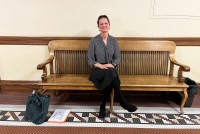Latest Morning Briefing Stories
Lawyer Fees Draw Scrutiny as Camp Lejeune Claims Stack Up
The Camp Lejeune Justice Act, which became law last year, created a pathway for veterans and their families to pursue damage claims against the government for toxic exposure at the military base. Now, advocates and lawmakers worry high lawyer fees could shortchange those injured.
‘A System in Crisis’: Dysfunctional Federal Disability Programs Force the Poor to Pass Up Money
With little or no income, disability applicants are seeking Social Security early retirement benefits even though it could cost them tens of thousands of dollars in future income, lawyers say.
PBMs, the Brokers Who Control Drug Prices, Finally Get Washington’s Attention
Drugmakers, pharmacies, and physicians blame pharmacy benefit managers for high drug prices. Congress is finally on board, too, but will it matter?
An Arm and a Leg: Mental Health ‘Ghost Networks’ — And a Ghostbuster
What should you do when your search for an in-network mental health care provider comes up empty? Abigail Burman has some expertise to share.
El gobierno alerta sobre tarjetas de crédito para pagar facturas médicas
La Oficina de Protección Financiera del Consumidor estimó en su informe que, en solo tres años, de 2018 a 2020, las personas han estado pagando $1,000 millones en intereses diferidos de tarjetas de crédito médicas y otros financiamientos médicos.
Biden Administration Issues New Warning About Medical Credit Cards
Americans paid an estimated $1 billion in deferred interest on medical debt in just three years, the Consumer Financial Protection Bureau reports. The agency warns against medical credit cards, which are often pitched right in doctors’ offices.
Some Private Companies Charge Hefty Fees to Help Veterans With Disability Claims
Unaccredited companies promise to help veterans file for disability benefits. But unlike the thousands of service representatives who have been vetted and approved by the Department of Veterans Affairs to provide aid, these “medical consultants” or “coaches” operate with no restrictions on how much they can charge.
Readers and Tweeters Defend the Rights of Adults With Disabilities
KFF Health News gives readers a chance to comment on a recent batch of stories.
Montana Considers Requiring Insurance to Cover Fertility Preservation for Cancer Patients
Young cancer patients must act quickly to preserve their sperm and eggs once they get their diagnosis, and many can’t afford the cost.
What the Health? From KFF Health News: Dancing Under the Debt Ceiling
House Republicans passed their plan to raise the nation’s debt ceiling, along with major cuts to health (and other domestic) programs. Unlikely to become law, it calls for new work requirements for adults on Medicaid. Meanwhile, state efforts targeting trans people bear a striking resemblance to the fight against abortion rights. Jessie Hellmann of CQ Roll Call, Shefali Luthra of The 19th, and Sarah Karlin-Smith of the Pink Sheet join KFF Health News chief Washington correspondent Julie Rovner to discuss these issues and more. Also this week, Rovner interviews Renuka Rayasam, who reported the latest KFF Health News-NPR “Bill of the Month” feature, about a specialist’s demand to be paid as much as $15,000 before treating a woman’s serious pregnancy complication.
Expectant Mom Needed $15,000 Overnight to Save Her Twins
Doctors rushed a pregnant woman to a surgeon who charged thousands upfront just to see her. The case reveals a gap in medical billing protections for those with rare, specialized conditions.
What the Health? From KFF Health News: Will They or Won’t They (Block the Abortion Pill)?
The Supreme Court is considering the future of the abortion pill mifepristone, after GenBioPro sued the FDA over limitations that effectively block generic production of the drug, a major part of the market. Congress is considering proposals that would impose Medicaid work requirements, crack down on pharmacy benefit managers, and more. And President Joe Biden moved to expand health coverage to young immigrants known as “Dreamers.” Rachel Cohrs of Stat, Sandhya Raman of CQ Roll Call, and Joanne Kenen of the Johns Hopkins Bloomberg School of Public Health and Politico join KFF Health News’ Mary Agnes Carey to discuss these issues and more.
Lose Weight, Gain Huge Debt: NY Provider Has Sued More Than 300 Patients Who Had Bariatric Surgery
The private equity-backed practice has been known to demand more than $100,000 in charges or penalties. One patient is fighting back.
An Arm and a Leg: A $229,000 Medical Bill Goes to Court
Lisa French was told her surgery would cost $1,337. But the hospital sent her a bill for $229,000, then sued her. The case went all the way to the Colorado Supreme Court. The court’s ruling could have major implications for determining a “reasonable price” in health care.
California’s Medicaid Experiment Spends Money to Save Money — And Help the Homeless
Gov. Gavin Newsom’s ambitious experiment in health care is supposed to cut costs as it fills the needs of hard-to-reach people. The program’s start is chaotic and limited, but it shows promise.
Journalists Track Opioid Settlement Cash and Fees for Telehealth Visits
KFF Health News and California Healthline staff made the rounds on national and local media this week to discuss their stories. Here’s a collection of their appearances.
La empresa farmacéutica que prosperó sin crear ni un solo medicamento
Aunque Horizon afirma que ahora tiene 20 fármacos en desarrollo, en sus 15 años de existencia aún no ha obtenido la licencia de un producto de su creación.
The Drug Company That Prospered Without Creating Any Drugs
Horizon Therapeutics, which Amgen is acquiring for about $28 billion, grew large by snapping up cheap drugs from other companies, marketing them to perfection, and jacking up prices.
Para pacientes de cáncer sin seguro, conseguir atención médica es una lotería
Los estudios demuestran que, a veces, los adultos sin seguro retrasan la atención, lo que puede perjudicar las probabilidades de supervivencia. Pero que los pacientes obtengan un seguro para cubrir el tratamiento se parece un poco al juego de la ruleta, es decir, depende de dónde vivan y del tipo de cáncer que padezcan.
Special Medicaid Funds Help Most States, but Prompt Oversight Concerns
Georgia is among 35-plus states that have used an under-the-radar federal funding mechanism to boost payments for hospitals and other providers under Medicaid. But a government watchdog and a congressional advisory commission say sparse oversight makes it hard to tell if the “directed payments” program is meeting its goals.






















